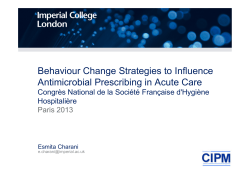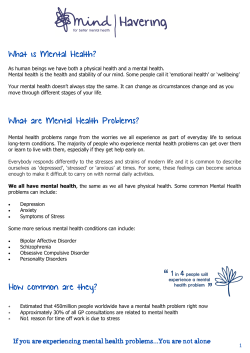
The Art of Social Prescribing - Institute of Cultural Capital
The Art of Social Prescribing: informing policy on creative interventions in mental health care Research Workshop: Researching Arts & Culture in Mental Health Care 11 May 2015 Blackburne House, Liverpool Kerry Wilson | #PrescribeArt #PrescribeArt 1 The project team • Kerry Wilson (PI), Head of Research, ICC – Research interests include cross-sector instrumental value of cultural organisations and services and implications for professional practice, identity and organisational culture. • Gayle Whelan, Research Fellow, ICC – Research interests include the social value of arts and cultural assets to communities; background in public health and wellbeing. • Rhiannon Corcoran (Co-I), Professor of Psychology, Heseltine Institute for Public Policy and Practice – Research interests include the psychological determinants of mental health. Flagship projects include the Prosocial Place Programme, addressing the ‘toxicity’ of cities for mental health. www.iccliverpool.ac.uk | www.liv.ac.uk/heseltine-institute/ #PrescribeArt 2 Arts, culture & mental health research • The ICC has remit to consider in greater depth the contribution of ‘culture’ to public policy agendas including health & wellbeing • Conversation with Mersey Care NHS Trust in 2012 sparked by shared interests in ‘holistic value’ of culture including social and economic impact, with a focus on creative interventions in mental health care • Driven by desire to be more systemic and resourceful with regards to cultural assets, decision-making and service delivery • Enter ‘Joining the Dots’ research programme: – Literature review of economic valuation research in arts and culture (2012-13) – Research Fellowship (Gayle, 2014-16) to undertake cultural asset mapping, and social value research in collaboration with Mersey Care www.joiningdotsresearch.net • Parallel research programme on the value and impact of NML’s dementia care training programme ‘House of Memories’ #PrescribeArt 3 ‘The Art of Social Prescribing’ project • Funded by Arts and Humanities Research Council under ‘Public Policy’ highlight notice • Opportunity to work with Rhiannon as leader of Heseltine’s Health and Wellbeing research theme • Designed to complement existing work of both centres and progressive work of Liverpool’s arts and cultural sector via: – Co-design of policy guidelines on arts-based social prescribing model for the city; – Co-design of professional guidelines on conducting policyrelevant research on creative interventions in mental health care • Supported by Mersey Care NHS Trust; NHS Liverpool CCG; Liverpool Health and Wellbeing Board; Cheshire and Merseyside Public Health Service. http://iccliverpool.ac.uk/?research=the-art-of-social-prescribinginforming-policy-on-creative-interventions-in-mental-health-care #PrescribeArt 4 Why social prescribing? • “Social prescribing provides a pathway to refer clients to nonclinical services, linking clients to support from within the community to promote their wellbeing, to encourage social inclusion, to promote self-care where appropriate and to build resilience within the community and for the individual” (Kimberlee, 2013) – Curiosity about efficacy of approach given its growing momentum in arts, health and wellbeing field – Fits with ideology of ‘Joining the Dots’ due to its cross-sector, collaborative, preventive, non-clinical qualities – Creates synergy via [potential] commissioning strategy for the various high-performing arts, health & wellbeing initiatives in the city, beyond ad-hoc project funding – Shift in cultural policy from grant-based arts funding to cultural commissioning by/within statutory services, see for example ACEfunded Cultural Commissioning Programme https://www.ncvo.org.uk/practical-support/public-services/culturalcommissioning-programme #PrescribeArt 5 Three elements to this work… 1. Social prescribing and arts and culture [practice] • • • How much do we know about creative interventions in mental health care? What is their value (actual and potential) as ‘socially prescribed’ interventions? What is the ‘lived experience’ of arts on prescription? 2. Researching arts and culture in mental health care • • • What are the characteristics and outcomes of ‘independent’ arts and humanities research in this area? What is the relationship between A&H research and ‘commissioned’ evaluation and social science? What are the comparative strengths/weaknesses in relation to the future viability of ‘arts on prescription’ research? 3. Valuing arts and culture in mental health care [policy] • • What is the [causal] relationship between research, policy and practice? How can the working relationships between these different communities of practice be developed and supported? • How do these relationships affect the way that the ‘value’ of arts and culture in mental health care is articulated and understood? *Methods include workshops; interviews; literature/evidence review; final conference. #PrescribeArt 6 Today’s workshop • Consider the existing evidence base on the efficacy, value and impact of [arts-based] social prescribing; • Identify the opportunities and challenges presented for future research in this area; • Consider the role and value of arts and humanities research in this context; • Start to develop a ‘best practice’ strategy for researching the efficacy and value of arts-based social prescribing in the Liverpool city region. #PrescribeArt 7 Evidence to inform the commissioning of social prescribing Centre for Reviews and Dissemination, University of York, February 2015 • Limited systematic reviews available; those included of ‘poor quality’, including small numbers, short follow-up times and differences in outcomes measured • Proliferation of ‘poorly designed’ evaluation studies, “producing a momentum for social prescribing that does not appear to be supported by robust research evidence of effect” • Summary of studies including “more formal, validated evaluation methods”, but these still demonstrate: – – – – High risk of bias due to lack of a ‘control’ study Limitations in use of proxy measures (e.g. SROI) Insufficient or incorrect use of ‘validated’ tools/measures Limitations of small-scale pilot studies versus more preferable largerscale comparative studies – Therefore no real trust in ‘causal relationships’. #PrescribeArt 8 Why so problematic? • Social prescribing presented as an alternative to clinical interventions, designed around social, community-based, ‘lifestyle’ activities to encourage self-management of mental health problems • Tension in balancing ‘clinical’ outcomes alongside naturally occurring ‘small scale’ wellbeing impacts such as improved confidence, self-esteem etc • Common problem in arts and health research, but extra layer of complexity created by the ‘prescription’ model in being clinically orientated, commissioned by and reliant upon effective partnership working with health services • Integrated, collaborative practice therefore requires integrated, multi-layered evidence-base #PrescribeArt 9 Methodological approaches commonly used • Standardised measures including General Health Questionnaire (GHQ-28); Warwick-Edinburgh Mental Wellbeing Scale (WEMWBS); Global Quality of Life Scale (GQOL) – Despite accepted reliability of such tools, problems include low/diminishing pre/post response rates; incomplete/unusable returns – Stigma associated with explicit mental health/wellbeing terminology; negating ‘empowering’ principles of social prescribing and affecting research participation rates (Brandling, 2011) #PrescribeArt 10 Alternative and complementary methods • Qualitative research: narrative –based studies presenting views of multiple-stakeholders (via semi-structured interviews); often presented quite ‘apologetically’ due to advocacy associations (i.e. self-selecting respondents giving answers they think we want to hear) • Social value and SROI: although respected as ‘an advanced form of cost benefit analysis’, studies inferring savings against costs of clinical mental health care are judged to be speculative due to lack of any rigorous longitudinal studies #PrescribeArt 11 Outcomes of arts on prescription schemes • Despite criticism and ‘limitations’ of existing evidence base, many positive outcomes are reported: • Increased uptake of arts, leisure, volunteering and education activities by vulnerable and at-risk groups, set against reduced levels of GP attendance (Friedli et al, 2009) • High regard for peer support from arts practitioners – “supportive, accessible, inspiring, sensitive, intuitive, interesting and skilled” (White & Salamon, 2010) • relationship between ‘soft’ outcomes, e.g. improved confidence, motivation and aspiration and ‘hard’ outcomes, e.g. further education and training (Stickley and Eades, 2013) • “Within one of the projects there was a strong sense of collective artistic endeavour which facilitated the building of social bonds and friendships and thus social capital” (Bungay and Clift, 2010) #PrescribeArt 12 USP of arts on prescription • Limited understanding within arts on prescription research of the ‘uniquely cultural’ value of these interventions: • Aesthetic imperative: need to understand the impact of the creative experience beyond the social enterprise. Many studies “fail to identify arts-specific aspects of the programmes” (Coulter, 2001) • Political imperative: need to articulate more clearly the unique value of arts-based social prescribing compared to other interventions within shrinking public resources (Goulding, 2014) • Professional imperative: ambition to develop practice in this area to support new cultural commissioning objectives. Bibliotherapy (books on prescription) movement provides a scalable example of arts-based SP, including effective articulation of quality and value in the cultural experience and relevant professional practice (Chamberlain et al, 2008; Brewster, 2009) #PrescribeArt 13 Other factors to consider • Understanding strategic, operational and learning processes as well as outcomes: – “The quality of professional partnerships is a crucial factor that is so far being under-examined in evaluation of arts and mental health” (White & Salamon, 2010) – “…difficulty in capturing data that satisfied health criteria, but that also captured the complicated [experiential] processes that participants underwent” (Goulding, 2014) #PrescribeArt 14 Justifying research approaches • It’s all relative: experiences of mental health problems and of ‘creativity’ are individual and nuanced; one-size-fits all measurement approaches are irrelevant • This is an emerging research field with time/opportunity to develop practice accordingly • Quality of qualitative research: sometimes difficult to establish ‘cause and effect’ due to lack of transparency in research design • Arts and humanities research: potentially offers participatory, immersive approaches to understanding the experiential process in relation to outcomes, especially in relation to intrinsic qualities of artistic experience • Effective justification and contextualisation of chosen approach can ultimately lead to a more powerful and meaningful advocacy of arts-based social prescribing #PrescribeArt 15 Today’s case studies • The Social and Economic Impact of Rotherham Social Prescribing Pilot – Chris Dayson, Centre for Regional Economic and Social Research • The Intrinsic Value of The Reader Organisation’s Shared Reading Scheme – Dr Josie Billington and Professor Phil Davis, Centre for Research into Reading, Literature and Society #PrescribeArt 16 Afternoon discussion • What do we need to know about arts-based social prescribing? • Who are we trying to convince? • How can we credibly ‘evidence’ and ‘advocate’? #PrescribeArt 17 Keeping in touch • Next workshop on policy-making process – 11th June 2015 • Conference in association with new economics foundation (nef) – 17th September 2015 • Presentations, working papers etc will be posted to project website • Email: k.m.wilson@ljmu.ac.uk • Twitter: @KWilsonWA8 | @iccliverpool • http://iccliverpool.ac.uk/?research=the-art-of-socialprescribing-informing-policy-on-creative-interventionsin-mental-health-care • www.joiningdotsresearch.net #PrescribeArt 18
© Copyright 2025









